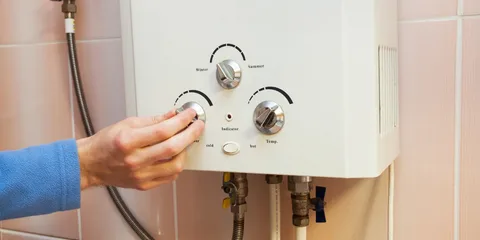What Are the Benefits of Choosing Gas Water Heaters Over Electric?
Water heaters are essential appliances in homes and businesses, providing hot water for various uses such as bathing, cooking, and cleaning. When selecting a water heater, you typically have two primary options: gas or electric. While both types can effectively heat water, many homeowners find that gas water heaters offer several advantages over electric models. In this article, we’ll explore the key benefits of choosing gas water heaters over electric ones.
1. Faster Heating Time
Why Gas Heats Water Faster
One of the major benefits of gas water heaters is their ability to heat water more quickly than electric models. Gas burners generate more heat, and this heat is transferred to the water more efficiently. As a result, a gas water heater can bring water to the desired temperature in less time.
Ideal For:
- Households with high water demand, such as larger families or homes with multiple bathrooms.
- Those who need hot water quickly for cooking, cleaning, or bathing.
2. Lower Operating Costs
Gas is Generally Cheaper
In most areas, natural gas is cheaper than electricity, which makes gas water heaters more cost-effective to operate in the long term. While the upfront cost of a gas water heater may be slightly higher than an electric model, the lower cost of gas for heating water can result in substantial savings over time.
Ideal For:
- Homeowners looking to reduce their monthly utility bills.
- Those who use hot water frequently and want to save money in the long run.
3. More Energy Efficient for Larger Households
Higher Efficiency for High Demand
Gas water heaters are often more energy-efficient for larger homes with higher hot water usage. While electric water heaters may take longer to heat large volumes of water, gas models can handle large amounts of water more efficiently, making them ideal for families with multiple bathrooms or high water demand.
Ideal For:
- Large families or homes with multiple occupants.
- Properties with high water usage due to appliances like dishwashers, washing machines, and large bathtubs.
4. Ability to Function During Power Outages
Gas Water Heaters Don’t Rely on Electricity
One significant advantage of gas water heaters is that they do not depend on electricity to operate. During power outages, a gas water heater will continue to function as long as there is gas supply. This feature is especially useful in areas that experience frequent power disruptions.
Ideal For:
- Homes located in areas with frequent power outages.
- Homeowners who want a reliable hot water source even when electricity is unavailable.
5. Longer Lifespan
Durability of Gas Water Heaters
Gas water heaters tend to have a longer lifespan than electric ones. With proper maintenance, a gas water heater can last 10-15 years, whereas electric water heaters may need replacement after 8-12 years. This means that while the initial investment may be higher, a gas water heater can provide years of reliable service.
Ideal For:
- Homeowners who want to invest in a durable, long-lasting appliance.
- Those who prefer to avoid the cost and hassle of frequent replacements.
6. Better for Larger Hot Water Demands
High Capacity for Larger Households
Gas water heaters are typically better equipped to handle large hot water demands. They can supply a constant flow of hot water without the need for long recovery times, making them ideal for large households or businesses where hot water is used frequently and in large volumes.
Ideal For:
- Larger homes or businesses with high water usage.
- Properties with multiple bathrooms or extensive water use in appliances.
7. Environmentally Friendly Option
Lower Carbon Footprint
Although gas water heaters run on fossil fuels, they tend to produce fewer emissions compared to electric water heaters, especially in areas where electricity is generated from coal or other high-emission sources. When natural gas is used efficiently, it can be considered a more environmentally friendly option than electricity, which often relies on more polluting energy sources.
Ideal For:
- Environmentally-conscious homeowners looking to reduce their carbon footprint.
- Those living in regions where electricity is predominantly generated from non-renewable sources.
8. More Compact Models Available
Space-Saving Gas Water Heaters
Gas water heaters come in a variety of sizes, and many are designed to be more compact, making them easier to install in tight spaces. Whether you’re looking for a traditional tank-style model or a modern tankless gas water heater, there are options that can fit well in smaller homes or apartments.
Ideal For:
- Homeowners with limited installation space.
- Those who prefer compact and space-saving appliances.
9. Availability of Tankless Gas Water Heaters
Continuous Hot Water with Tankless Systems
Gas water heaters offer tankless options, which provide an on-demand hot water supply without the need for a storage tank. Tankless gas water heaters heat water as it flows through the unit, providing endless hot water and eliminating the risk of running out. This makes them ideal for homes with high water demand.
Ideal For:
- Families who need a continuous supply of hot water.
- Homeowners looking to save space by eliminating bulky water tanks.
10. Conclusion
Choosing a gas water heater over an electric model can offer numerous benefits, including faster heating times, lower operating costs, and the ability to function during power outages. Gas water heaters are often more energy-efficient for larger households, have a longer lifespan, and can accommodate high water demand. While they may have a higher initial cost, their long-term savings and efficiency make them a smart investment for many homeowners. If you are looking for a reliable, cost-effective, and environmentally-friendly option, a gas water heater may be the right choice for you.
FAQs
1. What is the main advantage of a gas water heater over an electric one?
Gas water heaters heat water faster and are generally more cost-effective to operate, especially in larger households with high water demand.
2. Can a gas water heater work during a power outage?
Yes, gas water heaters don’t rely on electricity to operate, so they will continue to function during power outages as long as there is a gas supply.
3. Do gas water heaters last longer than electric ones?
Yes, gas water heaters typically have a longer lifespan, often lasting 10-15 years with proper maintenance, compared to electric models that usually last 8-12 years.
4. Are gas water heaters more energy-efficient?
Gas water heaters are generally more energy-efficient for larger households, as they can heat water quickly and maintain a constant supply without long recovery times.
5. Are there space-saving gas water heater options?
Yes, there are compact gas water heaters available, including tankless models that don’t require a large storage tank and can be installed in smaller spaces.
Author









